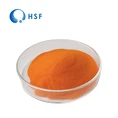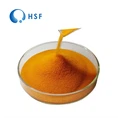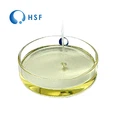What is Inulin?
Inulin is a type of dietary fiber that is commonly found in many plants, including chicory root, asparagus, garlic, and onions. It is a soluble, prebiotic fiber that is not digested in the small intestine but instead passes through to the large intestine, where it is fermented by beneficial bacteria in the colon. The consumption of inulin can have numerous beneficial effects on the human body, including increased satiety and improved digestive health. It has also been shown to lower blood sugar levels, reduce cholesterol levels, and improve insulin sensitivity. Additionally, some studies suggest that inulin consumption may help to prevent or manage certain chronic diseases, such as obesity, type 2 diabetes, and colon cancer.

Uses of Inulin
Inulin is used as a food ingredient to increase the fiber content of processed foods, such as bread and bars. It can also be added to supplements because of its prebiotic effects that support gut health.
Nutritional Benefits:
1. Low Calorie:
Inulin is a low-calorie food ingredient. It has about one-third the calorie density of sugar, making it an effective way to reduce calorie intake while still satisfying a sweet tooth.
2. High Fiber:
Inulin is a soluble fiber, which means it dissolves in water and forms a gel-like substance in the intestine. As a result, it helps to support digestive health by easing bowel movements and reducing constipation.
3. Prebiotic Effects:
Inulin helps the growth of beneficial bacteria in the gut, which promotes overall gut health. It does so by providing food, or substrate, for these beneficial bacteria.
4. Blood Sugar Control:
Inulin can help control blood sugar levels by slowing down glucose absorption into the bloodstream. This makes it a valuable ingredient in products geared towards diabetic or glucose intolerant individuals.
5. Weight Loss:
Inulin can help with weight loss by inducing feelings of fullness and reducing overeating. It is effective due to its high fiber content, which helps people feel full and satisfied for a longer period of time.
Inulin is a type of plant-based carbohydrate that has several health benefits. It can be found in a variety of foods or added to processed foods as an ingredient. Inulin's nutritional benefits include low calorie, high fiber, prebiotic effects, blood sugar control, and weight loss. As such, inulin is a valuable addition to a well-balanced diet that prioritizes digestive health.

Application of Inulin
Inulin is a type of soluble fiber that is commonly found in many plants. It has numerous benefits for human health and is widely used in various industries such as food, supplement, and cosmetics.
- In the food industry, inulin is commonly used as an ingredient for baked goods, dairy products, confectionery, beverages, and meat products. For baked goods, it can be used as a fat replacer, often improving the texture and moisture retention of the product.
- In dairy products, it is commonly used to improve the texture and thickness of yogurts and ice creams. In confectionery, it can be used as a sugar substitute, adding sweetness without the added calories.

- In beverages, it is commonly used as an emulsifier and stabilizer, preventing separation of ingredients.
- In meat products, it can be used as a binding agent and moisture retainer.
- In the supplement industry, inulin is often used as a prebiotic, providing food for the beneficial bacteria in the gut. It can also help to regulate blood sugar levels and improve digestion.
- In the cosmetics industry, inulin is commonly used as a natural alternative to synthetic thickeners, adding texture and viscosity to lotions and creams. It can also help to improve the shelf life of products by acting as a natural preservative.

Inulin is a Valuable Addition to a Healthy Lifestyle
Inulin is a type of dietary fiber that can be extracted from various plants, such as chicory root, Jerusalem artichoke, and agave. Not only is it a versatile ingredient for food and beverage products, but it also offers numerous health benefits, such as improving gut health, reducing blood sugar levels, and promoting weight loss. However, not all inulin is created equal. Choosing the right inulin is vital for product quality. Factors such as the source, extraction method, and degree of purity can greatly impact its functionality and sensory properties. Therefore, it is important to work with a reputable supplier that can provide consistent and high-quality inulin.
Inulin is a valuable addition to a healthy lifestyle. It is a prebiotic fiber that can nourish the beneficial bacteria in our gut, leading to improved digestion and immune function. Furthermore, inulin has a low glycemic index, which means it can help control blood sugar levels and reduce the risk of diabetes. Additionally, its ability to promote satiety can aid in weight management.

Iinulin is a versatile and healthy ingredient that offers many benefits for both the food industry and consumers. When choosing inulin, it is important to consider quality and source. Incorporating inulin into a balanced diet can improve overall health and well-being.





